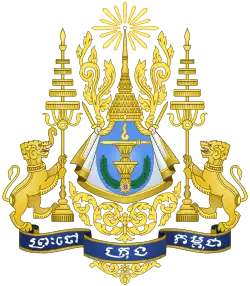Democratic National Union Movement | |
|---|---|
| Abbreviation | DNUM |
| Leader | Ieng Sary |
| Founded | August 1996 |
| Dissolved | November 2007 |
| Split from | CNUP |
| Newspaper | Phka Rik |
| Ideology | Limited democracy |
The Democratic National Union Movement (DNUM) (Khmer: ចលនាសហភាពជាតិប្រជាធិបតេយ្យ) was a Cambodian political party founded after senior Khmer Rouge official Ieng Sary's defection from the Cambodian National Unity Party in August 1996. A magazine entitled Phka Rik (Flower in Bloom) is associated with it.[1] It was created primarily to facilitate Ieng Sary's reentry into civilian political life, claiming neutrality and that he had broken away from the Khmer Rouge and from the "fascism and cruelty of Pol Pot's regime," naming Nuon Chea, Ta Mok, Son Sen and Yun Yat as Pol Pot's cohorts and "mass murderers of Cambodia." He stated that he was a supporter of "limited democracy"; he named Thailand, Singapore, and Japan as examples.[2]
Despite building up ties with the Cambodian People's Party (CPP), founded by Hun Sen, the DNUM declined to participate in the 1998 elections.[3] The Movement's support for the CPP-dominated government at the time allowed it considerable autonomy over Pailin, an ex-Khmer Rouge stronghold notable for gem and timber exports.[4][5]
See also
References
- ↑ Fawthrop, Tom; Jarvis, Helen (2005). Getting Away With Genocide? Elusive Justice and the Khmer Rouge Tribunal. UNSW Press. p. 262. ISBN 9780868409047.
- ↑ Maguire, Peter H. (2005). Facing Death in Cambodia. Columbia University Press. pp. 103-104. ISBN 9780231120524.
Sary claimed that his Democratic National Union Movement had broken away "from the fascism and cruelty of Pol Pot's regime." Ieng Sary's first press conference after his defection occurred in a safe house near Phnom Malai on August 28, 1996. Flanked by the commanders of the Pailin and Phnom Malai regions, the former Khmer Rouge leader said that he had decided to break away from "the dictatorial group of Pol Pot, Ta Mok, and So Sen" to end the decades of war. [...] Ieng Sary finished the interview by claiming he supported limited democracy, like that practiced in Singapore, Thailand, and Japan. [...] Ieng Sary's public relations effort shifted into high gear when he ... distributed a ten-page, typed document entitled, "True Facts About Pol Pot's Dictatorial Regime, 1975-1978." The report ... blamed the Khmer Rouge atrocities on Pol Pot and his "secret security committee" run by Nuon Chea, Son Sen and his wife Yun Yat, and Ta Mok — these were the real "mass murderers of Cambodia."
- ↑ Economist Intelligence Unit. Country Report: Cambodia, Laos. 1998. p. 8.
- ↑ Grant Curtis. Cambodia Reborn? The Transition to Democracy and Development. Washington, DC: Brookings Institution Press. 1998. p. 42.
- ↑ Susan E. Cook. Genocide in Cambodia and Rwanda: New Perspectives. New Jersey: Transaction Publishers. 2006. p. 205.
